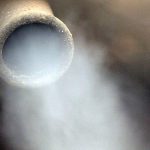Due to the poor supply of electricity in Nigeria, generators have become a major source of power supply. Most offices, homes, shops are now being run by generators. Apart from the power they supply, generators are known sources of air pollution. The air they release are toxic to human health and are also known as fumes.

These fumes can be deadly when a certain amount is being inhaled, as carbon monoxide– a major gas in generator fumes, replaces oxygen in the body tissues. When oxygen is being displaced in the body, it prevents blood from carrying out its functions, including transporting oxygen around the body, thus leading to death.
Carbon monoxide is a dangerous, invisible, odourless and colorless gas which can be deadly. Therefore, inhaling this toxic gas into the body leads to death.
Effects
- Exposure to moderate and high levels of carbon monoxide over a long period of time has been linked with an increased risk of heart disease. This could also lead to a shorter life span.
- Breathing air from generator fume can cause headaches, dizziness, fatigue, vomiting, and nausea.
- People who survive severe poisoning from generator fumes may suffer long-term health problems.
- Inhaling this gas can lead to hypoxia and damage to the nervous system.
- Inhaling carbon monoxide could lead to unconsciousness and death in less than three minutes if 12,800pm (1.28) is being inhaled.
- Carbon monoxide poisoning in pregnant women may cause severe adverse fetal effects.
Other effects include:
- Pneumonia
- Skin lesions
- Acute kidney failure
- Muscle necrosis
- Visual problems
Precautionary measures – In order to prevent its effects on health, certain precautionary measures are to be followed.
- Avoid placing/directing exhaust pipe of generators to windows in order to prevent carbon monoxide poisoning.
- Try fixing your generator when you notice the discharge of excess fume.









